
Reviewed by Marcus Tan
In her flash fiction “Bleeding Girls Initiation Ritual,” Claire Polders shows us the resilience of the collective in a deft exploration of patriarchal structures and symbols. She never shies away from the lyrical, instead harnessing musicality to create evocative, memorable images: “We dance around the fire, ashen hands in the air, ready to accept the power that is naturally ours.” Authority and submission jostle for space and at the end, but what lingers in my mind is the violence expressed as a necessary tool to escape the mechanism of oppression: “His back carves out a pit that fits his body like a grave. We refuse to grant him a last wish. We close the grave.” In her debut collection Woman of the Hour: Fifty Tales of Longing and Rebellion [Vine Leaves Press, July 2025], Polders reveals she is not afraid of vulnerability. Comprising fifty distilled stories, each no longer than three pages, Polders’ collection celebrates the vivacity of womanhood.
Time and its liminality shimmer beneath each story. It’s right there in the collection’s title and its eponymous story. “Woman of the Hour” presents a countdown from sixty minutes, each passing minute taking us through a different layer of identity: mother, wife, daughter, friend, employee, and finally, of her memory as a child, where she “would stand on the makeshift stage of their shoddy living room rug… acting out all the parts and getting applauded by the merry adults, including her mother, for so convincingly being anyone but herself.”
Polders lives inside her flash, in that little flicker of time when an entire universe bursts alive, expands, and then disappears. Blink and it’s gone. But therein lies the power of Polders’ flash fiction. Each story deserves to be read twice over: first inhaled as quickly as possible, letting the explosion of tension and musicality hit you all at once. Then again, to savor each moment like a meditation.
As much as Polders is a writer’s writer—her prose lean, her every metaphor deployed with precision—what makes her collection memorable is its unflinching reach to answer the Big Questions of constructing the self, of finding agency in a chaotic world, of finding your people. “Will they see me whole and know me better than I’ll ever know myself?” she asks in “Five Forbidden Friends,” excavating the secrets that form the undercurrent of friendship and community.
Polders’ strength in flash is best shown in “Attic,” a story crafted with restraint and poetic economy, yet never feeling too small or too narrow in scope. Within a few hundred words, she immerses you in a universe rich with memory and grief and contemplation. The story’s “silent mother” is not prominently displayed on the page, but you feel her presence in every single word. The silent mother unfolds in brief, poignant moments, then disappears, leaving you to grieve and mourn as the narrator does. You are left to pick up the pieces: “The world in which I am innocent and brave seems no more real than the world in which I can fly.”
Womanhood forms the third rail of this collection—the electricity that drives the train of every story forward. How do women evolve to find balance within the world, protect themselves, and reclaim their power? In “Lost Animal Identities,” we watch a woman turn into a fox at the touch of a man. The fox saves her. Or does she save herself? To be a woman is to be protean. In this story, we begin in childhood with the loss of innocence. Then we awaken. We wade through adolescence, wrestling with the boundaries of the body. We stumble into adulthood, too aware of ourselves and our place in the world, ready to fight back against it all. And finally, Polders writes, “I roared.”
The body becomes terrain in “Double Life.” A woman is poked and prodded and promised that something real and concrete lies at the end of her journey. Yet all she can think about is ambiguity: of her life, of her child’s life, of her doctor’s life. “The tag on the unisex uniform showed no first name, as though to confuse me on purpose. I felt ashamed of having that thought, yet that shame didn’t stop me from having that thought more than once.” What does it mean to have agency in a medical space where you are asked to give up control over your body and listen to the guidance of the stranger who now holds your life in their hands?
Polders takes on the elusive search for selfhood after loss in “Copycat.” If you transform your environment and the people you interact with, can you also transform yourself? In the narrator’s pursuit of new, young, idealized love, they tumble into the contrasting terrain of their own aging body and mortality: “The sea bit me. The waves beat me up. But I was determined to make my lessons erotically satisfying, because if Jan-Willem could do it, so could I.” Reclaiming the self is a messy, messy affair, and Polders never shies away from the ugly bits.
And then, you arrive at the end, at the terminus of this journey you’ve taken through womanhood and the body and the self. In “Looking for a Place to Die,” you join the narrator and “sleepwalk into town, arm in arm, down the street of black stockings and long skirts, our flat heels click-clacking on the cobblestones.” Polders strikes a delicate balance between the real and the imagined, between dream and wakefulness, between past and present. You are taken on a journey through the narrator’s life and memories, and you share their exhaustion at the endless obstacles in their way. Through it all, Polders reminds you of ever-present beauty, succinctly expressed in the final line: “What a delight it is, we think, to live in a world in which you can witness the dawn multiple times a day.” Polders’ collection does not comprise polite, well-behaved stories, no. They are fierce, bruised, and unflinchingly alive.
________________________
 Marcus Tan is a writer from Singapore residing in Hong Kong. His latest story, ‘All This is Yours to Lose’, was a finalist for the 2021 Masters Review Short Story Award and was shortlisted for the 2021 Exeter Story Prize. His fiction has been anthologized in The Best Small Fictions 2021 and published in Prime Number Magazine, No Contact Magazine, and elsewhere. Find him at marcus-tan.com.
Marcus Tan is a writer from Singapore residing in Hong Kong. His latest story, ‘All This is Yours to Lose’, was a finalist for the 2021 Masters Review Short Story Award and was shortlisted for the 2021 Exeter Story Prize. His fiction has been anthologized in The Best Small Fictions 2021 and published in Prime Number Magazine, No Contact Magazine, and elsewhere. Find him at marcus-tan.com.
